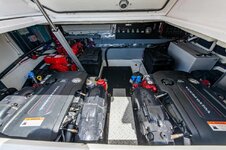Meanwhile, in the UK:
Plus America’s Big Three still can’t agree with striking unions and Europe waters down emissions targets

jalopnik.com
 1st Gear: Automakers ‘Moved On’ From Gas Power
1st Gear: Automakers ‘Moved On’ From Gas Power
Across Europe, automakers are preparing for the pivot away from gas-powered cars when a ban on their sale comes into force in 2035. That’s the same timeline being worked to in states like New York and California, when sales of new gas-powered cars will also be outlawed. But initially, the UK forged its own path and pledged to ban the sale of cars running on fossil fuels by 2030. However, unelected leader Rishi Sunak has now backtracked on several climate pledges, including the ban on new gas-powered cars.
The announcement to delay the ban until 2035, which came last week, has outraged automakers that were committed to this policy, according to a report from CNN. Now, companies like Nissan that were working towards the 2030 ban have condemned the UK’s climate targets.
According to an update shared by the Financial Times, Nissan boss Makoto Uchida said that the world needs to “move on” from running our cars on gasoline. He also added that the Japanese automaker “will never launch another engine-driven model in Europe,” the FT reports. According to the site:
“There’s no going back,” he said. “The world needs to move on from internal combustion engines.”
He referenced the delay announced last week and added: “[We] have a responsibility to be part of the solution and part of the eco system.”
Despite the UK’s decision to backtrack its policies, Nissan says it will still make the pivot to an entirely electric lineup across Europe by the end of the decade. So far, the company offers three EVs in Europe, including the Leaf hatchback, Aryia SUV and an all-electric Townstar compact van.
4th Gear: Europe Takes Another Look At Emissions Targets
Ahead of its 2035 ban on the sale of new gas-powered cars, lawmakers in the European Union are preparing to outline strict new emissions targets that internal combustion engined models must meet from 2025. However, the measures have proven controversial across the block and Europe has now unveiled a “watered down” version of the regulations, called Euro 7.
According to British outlet Autocar, the Euro 7 rules target non-CO2 pollutants, placing tight restrictions on the amount of nitrogen oxide, which is released by brake and tire wear, and carbon monoxide that gas-powered cars can emit. Autocar reports:
“The core aim is to make ICE as clean as possible, and to do that, EU7 will bring diesel and petrol engines under identical regulatory emissions limits for the first time,” said engineering firm Mahle Powertrain.
Legal output of carbon monoxide (CO) will be halved, while particle emissions will be reduced up to 30%, by including the smallest (10nm) size. Limits for oxides of nitrogen (NOx) hydrocarbons (HC) and total particulates remain the same as the latest EU6d regs, though, raising questions about the cost-effectiveness of EU7.
Currently, the new regulations are set to come into force in July 2025, after which point most large automakers will have to comply with the new rules. However, the EU has made exceptions to “low-volume, independent manufacturers.” Companies that sell fewer than 10,000 units across Europe will have until July 2030 to comply.





















